The Myanmar Construction Entrepreneurs Federation (MCEF) and a delegation of Vietnamese businesspeople jointly held the Myanmar-Vietnam Construction Business Matching event on the morning of 23 June at 9:30 am. The event took place at the MCEF office, located at the corner of Thanthuma Road and Waizayanta Road in Thingangyun Township, Yangon.
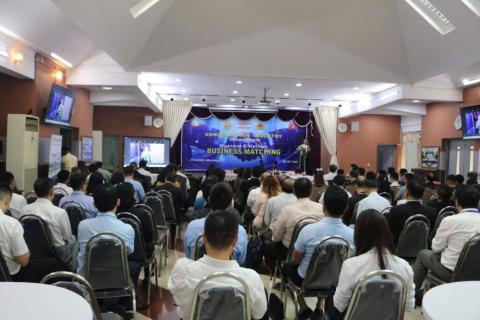
The Myanmar Construction Entrepreneurs Federation (MCEF) and a delegation of Vietnamese businesspeople jointly held the Myanmar-Vietnam Construction Business Matching event on the morning of 23 June at 9:30 am. The event took place at the MCEF office, located at the corner of Thanthuma Road and Waizayanta Road in Thingangyun Township, Yangon.
MCEF Chairman U Shane Win delivered welcoming remarks, followed by a speech from Mr Ly Quoc Tuan, the Vietnamese Ambassador to Myanmar. The ambassador and the chairman also exchanged commemorative gifts as part of the event.
During the session, representatives from 22 Vietnamese companies in the construction sector showcased their products and services. Following the presentations, more than 20 types of business discussions were held, with participation from Myanmar construction entrepreneurs, engineers, and suppliers. — Myo Min Thura/KZL
Source: GNLM
The Myanmar Construction Entrepreneurs Federation (MCEF) and a delegation of Vietnamese businesspeople jointly held the Myanmar-Vietnam Construction Business Matching event on the morning of 23 June at 9:30 am. The event took place at the MCEF office, located at the corner of Thanthuma Road and Waizayanta Road in Thingangyun Township, Yangon.
MCEF Chairman U Shane Win delivered welcoming remarks, followed by a speech from Mr Ly Quoc Tuan, the Vietnamese Ambassador to Myanmar. The ambassador and the chairman also exchanged commemorative gifts as part of the event.
During the session, representatives from 22 Vietnamese companies in the construction sector showcased their products and services. Following the presentations, more than 20 types of business discussions were held, with participation from Myanmar construction entrepreneurs, engineers, and suppliers. — Myo Min Thura/KZL
Source: GNLM
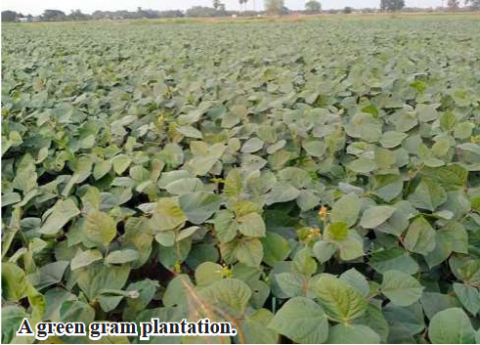
Monywa June 24
Monywa Township Agriculture Department of Sagaing Region stated that more than 3,000 acres of green gram has been planted in the township this monsoon.
In the 2025-2026 monsoon crop season, it is planned to cultivate 10,300 acres of green gram in Monywa Township. Cultivation began in May of this year, and as of today, a total of 3,195 acres have already been planted.
Monywa June 24
Monywa Township Agriculture Department of Sagaing Region stated that more than 3,000 acres of green gram has been planted in the township this monsoon.
In the 2025-2026 monsoon crop season, it is planned to cultivate 10,300 acres of green gram in Monywa Township. Cultivation began in May of this year, and as of today, a total of 3,195 acres have already been planted.
"For this monsoon crop season, more than 10,000 acres of green gram are planned to be cultivated in Monywa Township. As of today, over 3,000 acres have already been planted. Efforts are being made to meet the targeted acreage. Awareness campaigns are also being conducted regarding the expansion of green gram cultivation, including the use of quality and pure seeds to achieve good yields," said U Soe Thet Aung, Head of the Monywa Township Department of Agriculture.
This year, the Monywa Township Department of Agriculture is providing education and support to green gram farmers on topics such as the use of high-quality and region-appropriate pure seeds, correct planting methods, pest prevention, proper use of fertilizers, and techniques to ensure high yields.
During this year’s monsoon season, in order to ensure both high yield and good quality of various types of pulses, the department is collaborating with farmers to provide necessary support such as quality seeds, agricultural inputs, and post-harvest technologies.
Source: Yadanar Bon Newspaper
Monywa June 24
Monywa Township Agriculture Department of Sagaing Region stated that more than 3,000 acres of green gram has been planted in the township this monsoon.
In the 2025-2026 monsoon crop season, it is planned to cultivate 10,300 acres of green gram in Monywa Township. Cultivation began in May of this year, and as of today, a total of 3,195 acres have already been planted.
"For this monsoon crop season, more than 10,000 acres of green gram are planned to be cultivated in Monywa Township. As of today, over 3,000 acres have already been planted. Efforts are being made to meet the targeted acreage. Awareness campaigns are also being conducted regarding the expansion of green gram cultivation, including the use of quality and pure seeds to achieve good yields," said U Soe Thet Aung, Head of the Monywa Township Department of Agriculture.
This year, the Monywa Township Department of Agriculture is providing education and support to green gram farmers on topics such as the use of high-quality and region-appropriate pure seeds, correct planting methods, pest prevention, proper use of fertilizers, and techniques to ensure high yields.
During this year’s monsoon season, in order to ensure both high yield and good quality of various types of pulses, the department is collaborating with farmers to provide necessary support such as quality seeds, agricultural inputs, and post-harvest technologies.
Source: Yadanar Bon Newspaper
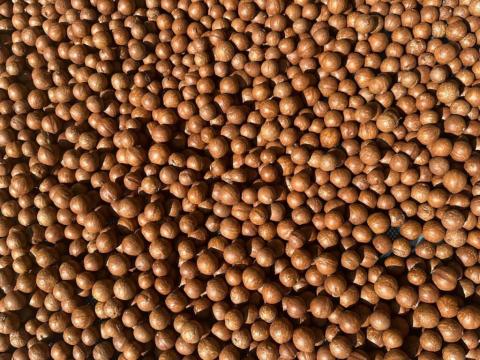
According to inquiries from macadamia growers and sellers, the foreign market is also interested in and buying macadamia nuts from southern Shan State.
Having good taste, rich nutrients and health benefits, these nuts are consumed directly as well as used in chocolate and various pastries.
“In terms of market conditions, Myanmar has a very good market. Good markets include Thailand and China. Domestic demand is high. This year, we have seen rising demand from Thailand. China has also bought a lot,” said a macadamia producer and distributor in Shan State.
According to inquiries from macadamia growers and sellers, the foreign market is also interested in and buying macadamia nuts from southern Shan State.
Having good taste, rich nutrients and health benefits, these nuts are consumed directly as well as used in chocolate and various pastries.
“In terms of market conditions, Myanmar has a very good market. Good markets include Thailand and China. Domestic demand is high. This year, we have seen rising demand from Thailand. China has also bought a lot,” said a macadamia producer and distributor in Shan State.
In Myanmar, macadamia is mostly grown in Shan State, followed by Kachin, Chin and Mandalay. The total area of cultivation has expanded to more than 12,000 acres. There are also small-scale farmers, and macadamia nuts grown in Ywangan Township can be harvested twice a year, so they can be sold at a higher price in the market, he continued.
“Macadamia nuts are also grown in Ywangan, Tachilek, and Nawnghkio and on the Myanmar-China border. Among them, Ywangan’s variety is considered to have two seasons- April to June and another one after it. In other places, it is harvested only once in August, September or October,” he explained. – Htet Oo Maung/ZN/Ed
Source: GNLM
According to inquiries from macadamia growers and sellers, the foreign market is also interested in and buying macadamia nuts from southern Shan State.
Having good taste, rich nutrients and health benefits, these nuts are consumed directly as well as used in chocolate and various pastries.
“In terms of market conditions, Myanmar has a very good market. Good markets include Thailand and China. Domestic demand is high. This year, we have seen rising demand from Thailand. China has also bought a lot,” said a macadamia producer and distributor in Shan State.
In Myanmar, macadamia is mostly grown in Shan State, followed by Kachin, Chin and Mandalay. The total area of cultivation has expanded to more than 12,000 acres. There are also small-scale farmers, and macadamia nuts grown in Ywangan Township can be harvested twice a year, so they can be sold at a higher price in the market, he continued.
“Macadamia nuts are also grown in Ywangan, Tachilek, and Nawnghkio and on the Myanmar-China border. Among them, Ywangan’s variety is considered to have two seasons- April to June and another one after it. In other places, it is harvested only once in August, September or October,” he explained. – Htet Oo Maung/ZN/Ed
Source: GNLM
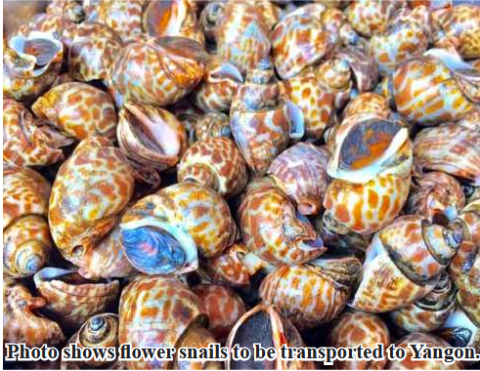
Pyapon June 23
Merchants from Pyapon Township of Ayeyawady Region shipped 65,000 viss of flower snails to Yangon market in May this year, said Daw Aye Thu, the owner of fishery product trading commodity in Pyapon Township.
They sent 45,000 viss of flower snail to Yangon in April but 65,000 viss in May. Daw Aye Thu disclosed: “Local merchants sell fishery products to Yangon market.
Pyapon June 23
Merchants from Pyapon Township of Ayeyawady Region shipped 65,000 viss of flower snails to Yangon market in May this year, said Daw Aye Thu, the owner of fishery product trading commodity in Pyapon Township.
They sent 45,000 viss of flower snail to Yangon in April but 65,000 viss in May. Daw Aye Thu disclosed: “Local merchants sell fishery products to Yangon market.
Now, they sell 65,000 viss of flower snails. Currently, fishery products are in high demand at Yangon market. Its price depends on freshness and cleanliness. Seafood restaurants demand to purchase flowery snails. So, local merchants and fishermen are convenient in their livelihoods.”
It is reported that flower snails exported from Pyapon Township were priced up to K21,000 per viss. Due to good sales and increased exports not only of flower snails but also of other fishery products from the region, job opportunities are reportedly favorable for fishermen, individual traders, market stall operators, merchants, and freight vehicle rental service providers. Kyaw Kyaw Lin
Source: Yadanar Bon Newspaper
Pyapon June 23
Merchants from Pyapon Township of Ayeyawady Region shipped 65,000 viss of flower snails to Yangon market in May this year, said Daw Aye Thu, the owner of fishery product trading commodity in Pyapon Township.
They sent 45,000 viss of flower snail to Yangon in April but 65,000 viss in May. Daw Aye Thu disclosed: “Local merchants sell fishery products to Yangon market.
Now, they sell 65,000 viss of flower snails. Currently, fishery products are in high demand at Yangon market. Its price depends on freshness and cleanliness. Seafood restaurants demand to purchase flowery snails. So, local merchants and fishermen are convenient in their livelihoods.”
It is reported that flower snails exported from Pyapon Township were priced up to K21,000 per viss. Due to good sales and increased exports not only of flower snails but also of other fishery products from the region, job opportunities are reportedly favorable for fishermen, individual traders, market stall operators, merchants, and freight vehicle rental service providers. Kyaw Kyaw Lin
Source: Yadanar Bon Newspaper
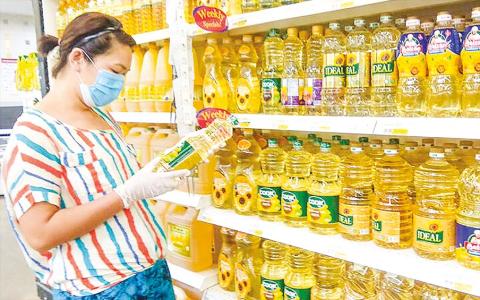
The wholesale reference rate of palm oil set for the Yangon market slightly declined to K6,080 per viss for the week ending 29 June from K6,110 per viss in the previous week ending 22 June, according to the Supervisory Committee on Edible Oil Import and Distribution.
The Supervisory Committee on Edible Oil Import and Distribution under the Ministry of Commerce has been closely observing the FOB prices in Malaysia and Indonesia, adding transport costs, tariffs and banking services to decide the wholesale market reference rate for edible oil weekly.
The wholesale reference rate of palm oil set for the Yangon market slightly declined to K6,080 per viss for the week ending 29 June from K6,110 per viss in the previous week ending 22 June, according to the Supervisory Committee on Edible Oil Import and Distribution.
The Supervisory Committee on Edible Oil Import and Distribution under the Ministry of Commerce has been closely observing the FOB prices in Malaysia and Indonesia, adding transport costs, tariffs and banking services to decide the wholesale market reference rate for edible oil weekly.
Despite the reference price, the market price is way too high.
To control overcharging, the Consumer Affairs Department under the Ministry of Commerce informed consumers of lodging complaints for overcharging through the call centre hotline in late August. The department urges consumers not to buy palm oil at high prices.
The Committee notified that any person who is involved in price gouging and oil storage to attempt market manipulation will face legal action under the Essential Goods and Services Law.
The department is working together with the Myanmar Oil Dealers’ Association and the cooking oil importing companies to offer affordable rates of imported palm oil for consumers.
The complaints for overcharging can be lodged over hotline 1535 of the call centre of the Consumers Affairs Department, or sent to the Facebook page of the department and the region and state departments concerned.
The domestic palm oil consumption is estimated at one million tonnes per year. The local palm oil production is just about 400,000 tonnes. About 700,000 tonnes of palm oil are yearly imported through Malaysia and Indonesia to meet domestic demands. — NN/KK
Source: GNLM
The wholesale reference rate of palm oil set for the Yangon market slightly declined to K6,080 per viss for the week ending 29 June from K6,110 per viss in the previous week ending 22 June, according to the Supervisory Committee on Edible Oil Import and Distribution.
The Supervisory Committee on Edible Oil Import and Distribution under the Ministry of Commerce has been closely observing the FOB prices in Malaysia and Indonesia, adding transport costs, tariffs and banking services to decide the wholesale market reference rate for edible oil weekly.
Despite the reference price, the market price is way too high.
To control overcharging, the Consumer Affairs Department under the Ministry of Commerce informed consumers of lodging complaints for overcharging through the call centre hotline in late August. The department urges consumers not to buy palm oil at high prices.
The Committee notified that any person who is involved in price gouging and oil storage to attempt market manipulation will face legal action under the Essential Goods and Services Law.
The department is working together with the Myanmar Oil Dealers’ Association and the cooking oil importing companies to offer affordable rates of imported palm oil for consumers.
The complaints for overcharging can be lodged over hotline 1535 of the call centre of the Consumers Affairs Department, or sent to the Facebook page of the department and the region and state departments concerned.
The domestic palm oil consumption is estimated at one million tonnes per year. The local palm oil production is just about 400,000 tonnes. About 700,000 tonnes of palm oil are yearly imported through Malaysia and Indonesia to meet domestic demands. — NN/KK
Source: GNLM
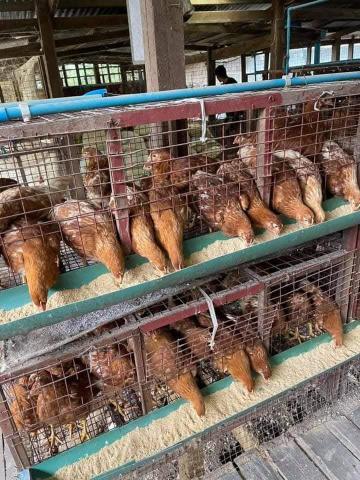
The number of local chicken breeders in upper Myanmar has increased, according to data from local sources.
Currently, native chicken trade is at a good price and sales are moderate, but there are more breeders of indigenous chicken because of its popularity.
“There are many interested people. Most of them are buyers from upper Myanmar. The prices are good in Taunggyi, Kengtung and Myitkyina,” said a local chicken trader and breeder.
The number of local chicken breeders in upper Myanmar has increased, according to data from local sources.
Currently, native chicken trade is at a good price and sales are moderate, but there are more breeders of indigenous chicken because of its popularity.
“There are many interested people. Most of them are buyers from upper Myanmar. The prices are good in Taunggyi, Kengtung and Myitkyina,” said a local chicken trader and breeder.
Raising local chickens can take from 2.5 to 4 months, and there is an advantage that they can still be kept even if they are not sold out.
“They are called local, indigenous or Bamar chickens. If they are of shorter days, meat is soft. It also depends on the input. If you feed them company feed, they will be ready in 2.5 to 3 months. If you mix your own feed, they will be ready for sale in 4 months,” he said.
As for inputs, in addition to ready-to-eat chicken feeds, breeders can prepare by mixing paddy, rice, broken rice, rice bran, cooked rice or mixture, green feed, bean meal cake and locally available silk leaves, boscai leaves, water spinach and water hyacinth and feed them in a bowl.
Htet Oo Maung /ZN
Source: GNLM
The number of local chicken breeders in upper Myanmar has increased, according to data from local sources.
Currently, native chicken trade is at a good price and sales are moderate, but there are more breeders of indigenous chicken because of its popularity.
“There are many interested people. Most of them are buyers from upper Myanmar. The prices are good in Taunggyi, Kengtung and Myitkyina,” said a local chicken trader and breeder.
Raising local chickens can take from 2.5 to 4 months, and there is an advantage that they can still be kept even if they are not sold out.
“They are called local, indigenous or Bamar chickens. If they are of shorter days, meat is soft. It also depends on the input. If you feed them company feed, they will be ready in 2.5 to 3 months. If you mix your own feed, they will be ready for sale in 4 months,” he said.
As for inputs, in addition to ready-to-eat chicken feeds, breeders can prepare by mixing paddy, rice, broken rice, rice bran, cooked rice or mixture, green feed, bean meal cake and locally available silk leaves, boscai leaves, water spinach and water hyacinth and feed them in a bowl.
Htet Oo Maung /ZN
Source: GNLM
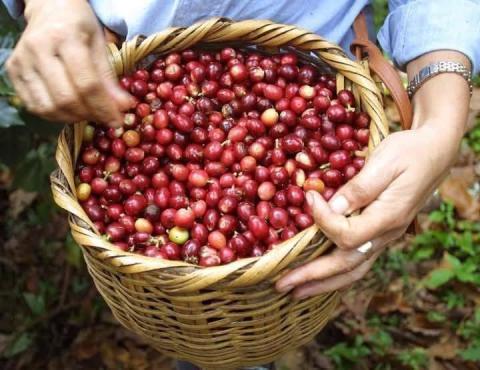
The Ministry of Agriculture, Livestock, and Irrigation has announced that technology will be provided to families interested in growing coffee, either at a manageable scale for families or for commercial purposes, in areas where the lowland coffee variety is predominantly cultivated.
The Ministry of Agriculture, Livestock, and Irrigation has announced that technology will be provided to families interested in growing coffee, either at a manageable scale for families or for commercial purposes, in areas where the lowland coffee variety is predominantly cultivated.
Five lowland coffee varieties with a maturity of one year and eight months and five with a maturity of 10 months, all successfully grown in the lowland, are being experimentally cultivated in Nay Pyi Taw. The ministry announced a production chain development plan to promote organic coffee production, highlighting its suitability for cultivation on a manageable scale in family patches.
Those interested in cultivating these lowland coffee varieties, either for family or commercial purposes, can contact the Coffee and Seasonal Crops Division of the Department of Agriculture for seeking technology and assistance.
In Myanmar, coffee is cultivated in two distinct ways, depending on the altitude above sea level. Highland coffee primarily consists of C. arabica, while lowland coffee is mainly C. robusta and C. liberica. The most common lowland coffee varieties are C. robusta and C. liberica.
Highland coffee varieties are grown at elevations between 2,700 and 5,400 feet above sea level, while lowland coffee varieties are cultivated at elevations from 0 to 2,700 feet. In Myanmar, highland coffee is grown in Shan, Chin, Kayah, and Kachin states, as well as the Mandalay Region, whereas lowland coffee is cultivated in Kayin and Mon states, along with the Sagaing and Taninthayi regions. — ASH/TH
Source: The Global New Light of Myanmar
The Ministry of Agriculture, Livestock, and Irrigation has announced that technology will be provided to families interested in growing coffee, either at a manageable scale for families or for commercial purposes, in areas where the lowland coffee variety is predominantly cultivated.
Five lowland coffee varieties with a maturity of one year and eight months and five with a maturity of 10 months, all successfully grown in the lowland, are being experimentally cultivated in Nay Pyi Taw. The ministry announced a production chain development plan to promote organic coffee production, highlighting its suitability for cultivation on a manageable scale in family patches.
Those interested in cultivating these lowland coffee varieties, either for family or commercial purposes, can contact the Coffee and Seasonal Crops Division of the Department of Agriculture for seeking technology and assistance.
In Myanmar, coffee is cultivated in two distinct ways, depending on the altitude above sea level. Highland coffee primarily consists of C. arabica, while lowland coffee is mainly C. robusta and C. liberica. The most common lowland coffee varieties are C. robusta and C. liberica.
Highland coffee varieties are grown at elevations between 2,700 and 5,400 feet above sea level, while lowland coffee varieties are cultivated at elevations from 0 to 2,700 feet. In Myanmar, highland coffee is grown in Shan, Chin, Kayah, and Kachin states, as well as the Mandalay Region, whereas lowland coffee is cultivated in Kayin and Mon states, along with the Sagaing and Taninthayi regions. — ASH/TH
Source: The Global New Light of Myanmar

Chairman of the State Administration Council Prime Minister Senior General Min Aung Hlaing, accompanied by Council Joint Secretary General Ye Win Oo, the Yangon Region Chief Minister, the Commander of Yangon Command and officials, inspected the production of the Solar Panel Factory, Tyre Factory (Ywama), No 3 Steel Mill (Ywama) and No 2 Steel Mill (Myaungtaga) in Yangon Region yesterday morning.
Chairman of the State Administration Council Prime Minister Senior General Min Aung Hlaing, accompanied by Council Joint Secretary General Ye Win Oo, the Yangon Region Chief Minister, the Commander of Yangon Command and officials, inspected the production of the Solar Panel Factory, Tyre Factory (Ywama), No 3 Steel Mill (Ywama) and No 2 Steel Mill (Myaungtaga) in Yangon Region yesterday morning.
Read more: https://www.gnlm.com.mm/renewable-energy-drive-powers-solar-factories/
Chairman of the State Administration Council Prime Minister Senior General Min Aung Hlaing, accompanied by Council Joint Secretary General Ye Win Oo, the Yangon Region Chief Minister, the Commander of Yangon Command and officials, inspected the production of the Solar Panel Factory, Tyre Factory (Ywama), No 3 Steel Mill (Ywama) and No 2 Steel Mill (Myaungtaga) in Yangon Region yesterday morning.
Read more: https://www.gnlm.com.mm/renewable-energy-drive-powers-solar-factories/
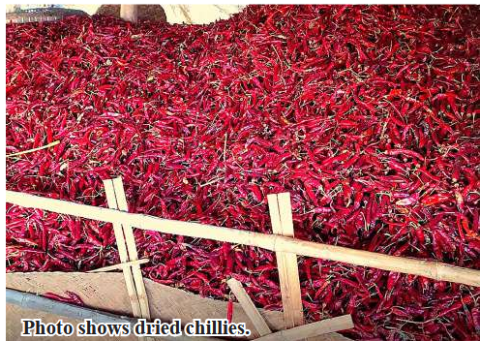
Wakema June 20
Local merchants from Wakema Township of Ayeyawady Region supplied 75,000 viss of dried chilli to Yangon market in May, said Daw Aye Moe, the owner of foodstuff trading depot in Wakema Township.
Wakema June 20
Local merchants from Wakema Township of Ayeyawady Region supplied 75,000 viss of dried chilli to Yangon market in May, said Daw Aye Moe, the owner of foodstuff trading depot in Wakema Township.
During the month of April this year, up to 50,000 viss of dried chilli from Wakema Township were exported and sold to the Yangon market. In the following month of May, from the 1st to the 31st, the volume increased to 75,000 viss. It is reported that the selling price for every 10 viss of dried chilli sold from the region fetched K89,000.
"In the past month alone, we exported and sold up to 75,000 viss of dried chilli from Wakema Township to the Yangon market. Besides other townships within Ayeyawady Region, most of the agricultural products from this area are mainly exported and sold to Yangon. The chillies produced in Wakema Township are of high quality. Because of this good quality, demand for the product is increasing. The chillies can be stored for a long time and are convenient for resale," said Daw Aye Moe.
Farmers in Wakema Township are engaged in chilli farming alongside rice cultivation. The chillies produced in this area are of good quality. Due to the improved quality and increased sales of dried chilli, farmers, laborers, traders, and market operators are reportedly enjoying better employment opportunities. Kyaw Kyaw Lin
Source: Yadanar Bon Newspaper
Wakema June 20
Local merchants from Wakema Township of Ayeyawady Region supplied 75,000 viss of dried chilli to Yangon market in May, said Daw Aye Moe, the owner of foodstuff trading depot in Wakema Township.
During the month of April this year, up to 50,000 viss of dried chilli from Wakema Township were exported and sold to the Yangon market. In the following month of May, from the 1st to the 31st, the volume increased to 75,000 viss. It is reported that the selling price for every 10 viss of dried chilli sold from the region fetched K89,000.
"In the past month alone, we exported and sold up to 75,000 viss of dried chilli from Wakema Township to the Yangon market. Besides other townships within Ayeyawady Region, most of the agricultural products from this area are mainly exported and sold to Yangon. The chillies produced in Wakema Township are of high quality. Because of this good quality, demand for the product is increasing. The chillies can be stored for a long time and are convenient for resale," said Daw Aye Moe.
Farmers in Wakema Township are engaged in chilli farming alongside rice cultivation. The chillies produced in this area are of good quality. Due to the improved quality and increased sales of dried chilli, farmers, laborers, traders, and market operators are reportedly enjoying better employment opportunities. Kyaw Kyaw Lin
Source: Yadanar Bon Newspaper
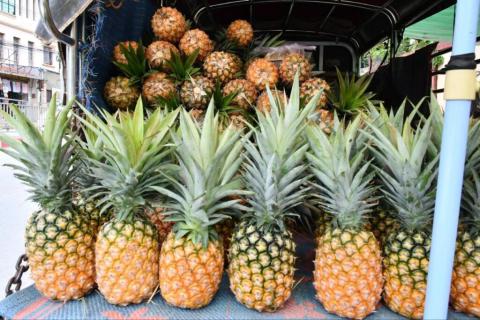
The purchase of pineapples has increased during their season, according to sellers and consumers. Due to the plenty of supply, the price is cheap, and pineapple is a favourable fruit for consumers, said a seller.
“Pineapple is abundantly available in the monsoon, and both old people and young people enjoy it. People eat it as a snack and also cook it. It is the season when the supply is abundant and the price is also cheap,” said a seller.
Some buy them to resell as juice.
The purchase of pineapples has increased during their season, according to sellers and consumers. Due to the plenty of supply, the price is cheap, and pineapple is a favourable fruit for consumers, said a seller.
“Pineapple is abundantly available in the monsoon, and both old people and young people enjoy it. People eat it as a snack and also cook it. It is the season when the supply is abundant and the price is also cheap,” said a seller.
Some buy them to resell as juice.
“Pineapple is rich in Vitamin C and other health benefits. So, we eat it often,” said a woman. — MT/ZS
Source: The Global New Light of Myanmar
The purchase of pineapples has increased during their season, according to sellers and consumers. Due to the plenty of supply, the price is cheap, and pineapple is a favourable fruit for consumers, said a seller.
“Pineapple is abundantly available in the monsoon, and both old people and young people enjoy it. People eat it as a snack and also cook it. It is the season when the supply is abundant and the price is also cheap,” said a seller.
Some buy them to resell as juice.
“Pineapple is rich in Vitamin C and other health benefits. So, we eat it often,” said a woman. — MT/ZS
Source: The Global New Light of Myanmar

